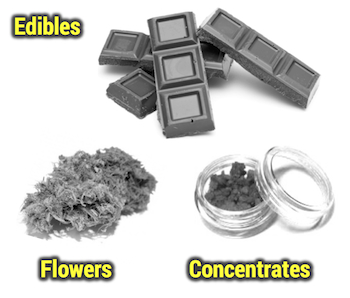
Alaska, Arizona, California, Colorado, Connecticut, Illinois, Maine, Massachusetts, Michigan, Montana, Nevada, New Jersey, New Mexico, New York, Oregon, South Dakota, Vermont, Virginia, Washington, and the District of Columbia are the only U.S. jurisdictions in which marijuana is currently legal for adult use.
Unless otherwise specified, the following information is specific to the laws in the states where marijuana is currently legal for adults. It should not be applied to any states in which marijuana is still illegal.
We should also mention that 36 states and the District of Columbia have adopted laws that allow people with certain debilitating conditions to use medical marijuana if their doctors recommend it.
It is legal for adults 21 years of age and older to possess limited amounts of marijuana. This includes state/district residents and adults visiting from other states.

Alaska: Adults 21 years of age and older can possess up to one ounce of cannabis, seven grams of cannabis concentrate, and up to six marijuana plants, plus all cannabis produced by personal cultivation in the same secure location where the cultivation occurred.
Arizona: Adults 21 years of age and older can possess up to one ounce of cannabis, including no more than five grams of concentrates, and six plants at the individual’s primary residence (with no more than 12 plants per household), plus all marijuana produced by personal cultivation in the same secure location where the cultivation occurred.
California: Adults 21 years of age and older can possess up to 28.5 grams (about an ounce, including eight grams of concentrate), and six plants per household, plus any cannabis grown from an adult’s plants; anything over 28.5 grams must be possessed at a secure location at home.
Colorado: Adults 21 years of age and older can possess up to two ounces and six plants (three flowering), plus all cannabis produced by personal cultivation in the same secure location where the cultivation occurred.
Connecticut: Adults 21 years of age and older can possess 1.5 ounces, or its equivalent, on one’s person; five ounces, or its equivalent, in a locked container at home or locked in glove box or trunk. (Equivalency: One ounce = five grams concentrate or 500 milligrams of THC in cannabis products) Starting July 1, 2023, secure cultivation of three mature and three immature plants at home will be allowed with a household cap of 12 plants.
District of Columbia: Adults 21 years of age and older can possess up to two ounces of marijuana and up to six marijuana plants. They can also possess any amount of marijuana produced by those plants in the residence where it was grown.
Illinois: Illinois residents 21 years of age and older can possess 30 grams (just over an ounce), five grams of concentrates, and infused products with up to 500 milligrams of THC. Non-residents 21+ can possess half those amounts.
Maine: Adults 21 years of age and older can possess 2.5 ounces (including up to five grams concentrate), three flowering plants, 12 immature plants, and unlimited seedlings, plus all cannabis produced by personal cultivation in the same secure location where the cultivation occurred.
Massachusetts: Adults 21 years of age and older can possess one ounce (including up to five grams concentrate) and up to six plants per person, with no more than 12 plants on the premises; in a locked location at one’s home: 10 ounces and any cannabis grown from an adult’s plants.
Michigan: Adults 21 years of age and older can possess 2.5 ounces, 15 grams of concentrates, and up to 12 plants (with no more than 12 plants on the premises). Up to 10 ounces may be kept in the home, so long as any amount over 2.5 ounces is kept under lock and key.
Montana: Adults 21 years of age and older can possess one ounce of cannabis, eight grams of concentrates, and two mature plants and two seedlings, plus any cannabis grown from an adult’s plants in a secure location.
Nevada: Adults 21 years of age and older can possess one ounce (including 1/8 ounce of concentrate), plus any cannabis grown from an adult’s plants in a secure location. (Home cultivation is permitted only for persons living at least 25 miles from a retail marijuana store. A person may grow up to six plants, in a secure location, but no more than 12 plants per household.)
New Jersey: Adults 21 years of age and older can possess six ounces or less of cannabis and 17 grams or less of hashish. Home cultivation is not permitted.
New Mexico: Adults 21 years of age and older can possesstwo ounces of marijuana, up to 16 grams of concentrated marijuana, and 800 milligrams of edible cannabis, plus six mature and six immature plants per adult, with a maximum of 12 mature plants per household.
New York: Adults 21 years of age and older can possess three ounces and 24 grams of cannabis concentrate. Home cultivation will be allowed within 18 months of the first adult-use sales, after rules have been crafted, permitting three mature and three immature plants, with a household cap of double that.
Oregon: Adults 21 years of age and older can possess up to one ounce of usable cannabis; 16 ounces of cannabis-infused solids; 72 ounces of cannabis-infused liquids, and five grams of extracts/concentrates; also up to eight ounces in a residence if it was grown in the home. Home cultivation limits are four plants, with a cap of four plants per residence.
South Dakota: Adults 21 years of age and older can possess one ounce of cannabis, including up to eight grams of concentrates, plus all cannabis produced by personal cultivation in the same secure location where the cultivation occurred. Adults can grow three plants if there are no retail stores in the local jurisdiction. Localities with retailers can opt-in to allowing home cultivation. Six plants per household cap. **This law is currently on hold pending a South Dakota Supreme Court decision.**
Vermont: Adults 21 years of age and older can possess up to one ounce, five grams of hashish, and two mature and four immature plants (same limit for entire residence).
Virginia: Adults 21 years of age and older can possess to one ounce of cannabis, or the equivalent amount of cannabis products, plus up to four cannabis plants. (The four-plant cap also applies to households.)
Washington: Adults 21 years of age and older can possess up to an ounce of cannabis, 16 ounces of cannabis-infused solids, and 72 ounces of cannabis-infused liquids. Home cultivation is not allowed.
 How do I legally obtain marijuana?
How do I legally obtain marijuana?From Retail Marijuana Stores: In most adult-use states, adults 21 years of age and older with a valid form of photo ID can purchase marijuana and marijuana-related products in licensed marijuana retail stores. Some of the states with newer laws are still in the process of creating regulated systems of retail marijuana stores.
From Another Adult: Adults 21 years of age and older can give up to one ounce of marijuana to other adults 21 years of age and older as long as it does not require any form of compensation. It is illegal to sell (or re-sell) any amount of marijuana without a business license.
Home Growing: In many of the adult-use states, adults 21 years of age and older are allowed to cultivate marijuana plants at home (plant limits vary by state). States that do not permit any home cultivation include Illinois, New Jersey, and Washington. Some other states require living a certain distance from retail stores in order to cultivate at home.

It is legal for adults to consume marijuana privately, such as inside residences, although some property owners or homeowners associations may have policies that prohibit it. It is illegal to consume marijuana in public places, such as on streets and sidewalks or in public parks. It is also illegal to consume marijuana on federal land. Violating public use laws could result in fines and other legal penalties.
In some Colorado localities, such as Denver, it is legal to consume marijuana openly at a residence — such as in the backyard or outside on a porch or balcony — as long as the property owner allows it. In other localities it is illegal to consume in view of the general public, so be sure to check your local laws. In Washington, it is illegal to consume or display marijuana anywhere in view of the general public.
Several states are now allowing on-site consumption at retailers or in designated cafes, smoke rooms, cannabis consumption lounges, or other social consumption areas. (Social consumption rules vary by state.)
Because these are new laws, there are still some questions regarding what constitutes “private” versus “public.” Therefore, you should exercise caution and check your local laws prior to consuming marijuana in any place that might be construed as public, such as hotel rooms or privately-owned businesses that are open to the public.
It is illegal to take any amount of marijuana across state lines, and doing so could result in significant legal penalties. It is legal to drive with marijuana in your car as long as it is in its original sealed packaging. We recommend keeping it in your trunk to avoid any possibility of it being considered an “open container.”
 It is illegal to drive under the influence of marijuana and can result in serious legal penalties.
It is illegal to drive under the influence of marijuana and can result in serious legal penalties.
Similar to a 0.08 blood-alcohol limit, both states have established a legal limit of 5 ng/ml of THC in whole blood. Colorado has a “rebuttable presumption” law, which means you are presumed to be impaired if you have 5 ng/ml of THC in your blood, but allows you to rebut that presumption in court. Washington has a “per se” law, which means you are automatically defined as impaired if you have 5 ng/ml of THC or more in your blood.
See the Know Your Responsibility section to find out how you can avoid driving while under the influence of marijuana.
Unfortunately, employers can still fire adults for responsible off-the-job marijuana use. We recommend learning about your employer’s policy prior to consuming marijuana.
Because marijuana is still illegal under federal law, using it can result in loss of certain benefits, such as public housing assistance and college financial aid.